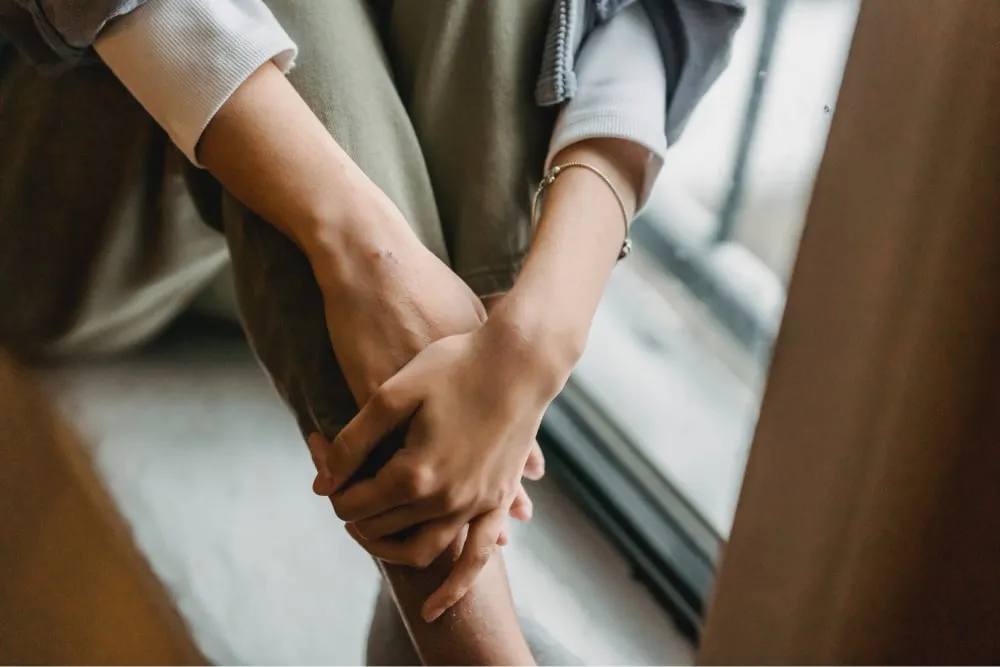How do you help someone with anorexia recognize the problem?
When wondering how to help someone who has anorexia, a good place to start is thinking about their behaviors.
Eating disorders all present differently, and your friend or family member may be experiencing different symptoms than those that are more widely known. At the same time, some disordered eating habits have become normalized and even admired in a mainstream culture heavily influenced by diet culture.
This can make it difficult not only to see the signs of AN in others, but for someone with AN to recognize a problem within themself. Learning more about the signs and symptoms of anorexia nervosa can help both you and your loved one more clearly understand what's going on and how important it is to seek help.
Signs your loved one may have anorexia nervosa
Contrary to the stereotype, anorexia nervosa can occur in people of any gender, age, ethnicity, and body size. Some common signs and symptoms of the disorder include, but are not limited to:2
- Intense fear of gaining weight
- Preoccupation with food, weight, and body image
- Restricting entire food groups from the diet
- Making excuses to avoid mealtimes of eating in front of others
- Regularly commenting that they feel fat
- Engaging in behaviors to purge calories, such as excessive exercise, diuretic or laxative use, or self-induced vomiting
- Social isolation
- Dramatic and sudden weight loss
- Non-specific gastrointestinal complaints, such as stomach pain, constipation, and acid reflux
- Menstrual irregularities (in individuals who menstruate)
- Dizzy spells and fainting
- Fine hair all over the body (lanugo)
- Dry skin and brittle hair
How to help a loved one with anorexia find treatment
Once your loved one acknowledges they need help, it's important to encourage them to seek it out. But broaching that subject—or airing your initial concerns about their health—can feel daunting.
The way you bring about this sensitive topic can make a difference in how you can help someone with anorexia, potentially influencing how receptive your loved one will be to what you have to say.
Start the conversation
If you haven’t approached your loved one yet about your concerns, it’s normal to feel anxious about it.
The best time to share your concern is outside the context of a meal and away from food altogether. Try to find a quiet space where you can be alone with your loved one and let them know what you have witnessed and why it concerns you. Remember, your loved one is likely dealing with a lot of heavy, difficult emotions, so try to speak with compassion and empathy.
If you can, stick to “I” statements, followed by what you have seen, such as “I notice you don’t join us for meals anymore, are you feeling okay?” Direct observations sound less accusatory, and will show your concerns in a way your loved one may be more receptive to hearing.
Additional conversation tips include:
3- Rehearse what you want to say
- Avoid over-simplistic solutions, such as “please stop”
- Remove the potential stigma and remind your loved one there is no shame in having anorexia nervosa
- Be honest and talk openly about your concern
- Don’t be discouraged if they refuse to talk about it
- Show compassion and ask if there is anything you can do to support them
Expect resistance
Someone with an eating disorder is likely going through a lot of emotional pain. It may not be easy for your loved one to admit or accept that they are struggling with a serious issue.
At first, your loved one may deny that there is a problem or try to rationalize their eating behaviors to you. This is actually a symptom of their eating disorder known as anosognosia, a condition where people with AN and other eating disorders can’t perceive their condition accurately, possibly due to the effects of malnutrition on the brain.1
While you can’t force someone to admit they have a problem, continuing to provide support until they feel ready is one of the best ways to help a friend with anorexia. Let them know that you’re always there to listen without any judgment, and when they are ready to ask for help, you’ll be by their side every step of the way.
Encourage them to seek professional help
Anorexia nervosa doesn't get better on its own, and can be life-threatening if left untreated. The sooner your loved one seeks treatment, the better their chances for a complete recovery will be.
If your loved one has yet to seek professional help, encouraging them to do so is a great way you can help someone with anorexia nervosa.
You may want to research
types of treatment for AN and nearby treatment options before speaking with your loved one. This can help you go into the discussion fully informed and give them the best and most honest options and information.
Offering to go with them to a doctor or therapist for their initial appointment can also be a relief, and promising to support them through their recovery journey can help them feel reassured that there will be someone there for them after making this difficult choice.
How to support someone with anorexia in recovery
It's always good to see your loved one's eating disorder being treated, with them taking steps toward healing.
But your support at this time can be just as important as it is early on in the process, to help someone with anorexia stay hopeful, keep working on their self esteem, and have a safe place to go if they're feeling overwhelmed or concerned about backsliding.
How to help people with anorexia in social situations
Building a strong support network is a crucial aspect of recovery from anorexia nervosa or any other eating disorder.
As the recovery process can be mentally, physically, and emotionally exhausting, it may take some extra effort to involve them in social situations. But it is one of the best ways to help someone with anorexia integrate into a loving, caring community and stop them from self-isolating.
You don't have to do this alone. Remote treatment is available and may be the best option for your loved one.
Learn more Some useful tips include:4
- Keep inviting them to join in with family and group activities, even if they often say no.
- Plan social events that don’t revolve around food or exercise. Instead consider trying out activities that are engrossing and distracting, such as board games or crafting.
- When you get together, avoid always talking about treatment or the eating disorder unless they bring it up first. Watch a movie together, start a book club, or take your dogs for a walk together.
- Avoid any comments about their body, weight, or appearance.
- If you do end up in a situation around food, ask what kind of support would be helpful. They probably do not want you to micromanage their eating, but it may help them to eat a feared food together, or to have you tell a distracting story during a group meal to make them feel less self-conscious about eating around others.
How do you help someone with anorexia at home?
If you live with someone in recovery or are a big part of their home life, there may be additional ways you can help support a loved one with anorexia nervosa, including:8
- Ensure you have everything at home for planned meals, to avoid anxiety around the situation.
- Offer to go food shopping for your loved one.
- If you're eating together, plan together with your loved one what you will be eating and when, and keep a mind to portion sizes.
- Encourage your loved one to return to hobbies they used to enjoy or try out some new hobbies with them that fit in around their treatment.
How to show up for yourself when helping someone with anorexia
While it's important to offer your loved one ongoing love and support in their struggle with AN, it's equally as important to show yourself some care.
Anorexia nervosa is not just difficult on the person going through it. The stress of the situation can easily extend to friends and family members. And when you're feeling stressed, it can turn compassion and patience into anger and frustration.
Make sure to make some room in your schedule for things that give you joy or help you relax. Go for a walk, write in a journal, listen to music, or do some yoga. You can't pour from an empty cup, so keeping yourself calm, clear, rested, and ready is one of the best ways you can help someone with anorexia.
Don't despair—help is available
Even if your talk with your loved one did not go well, or if you don’t feel you got through to them with your concerns, don’t get disheartened. You did the right thing by sharing your concerns with your loved ones, letting them know that you care about them.
You may have also given them something to think about, planting a seed that perhaps their behaviors surrounding food and their body are not what they should be. It may take time, but the concern from friends and family may just be the wake-up call they need, helping them take the steps towards recovery.
At Within Health, we will help support you through treatment for anorexia nervosa. Speak with our team today to learn more about our virtual care program.
Get help today 









































